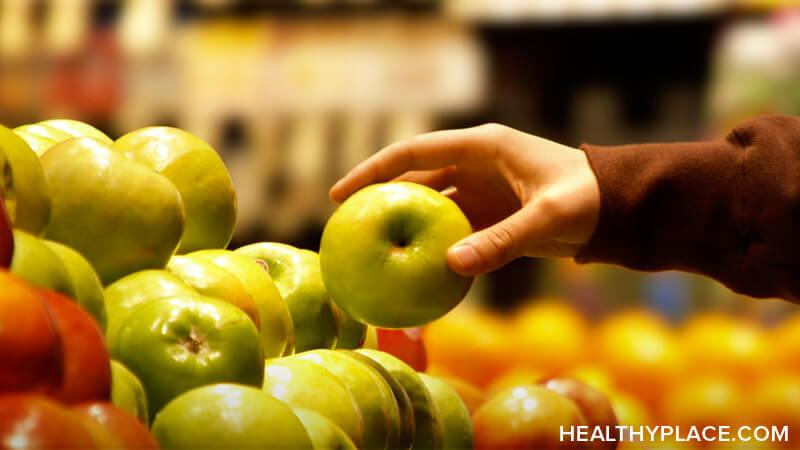Can Your Diet Reduce Anxiety?

Did you know that you can use your diet to reduce anxiety? Certain lifestyle and diet changes can reduce your anxiety when other strategies haven't completely worked for you. Even if you've created a calming space in your home, you've slowed down your anxiety, and you've cultivated self-kindness, using your diet to reduce anxiety may be the one thing you're missing.
A number of studies have demonstrated an association between anxiety and poorer diets, suggesting some connection between anxiety and your diet ("Do Foods Play a Role in Anxiety and Panic Attacks?"). However, these studies did not demonstrate that poor diet causes anxiety, just that the two are associated with one another. So what's the answer? Does anxiety lead to poorer diets, or do poor diets lead to increased anxiety?
There is some evidence that certain diets can protect against anxiety. In particular, the Meditteranean diet, a diet rich in fruits, vegetables, olive oil, fish, and beans, seems to reduce the likelihood of experiencing anxiety. It isn't clear why this effect occurs, and there is still mixed evidence regarding the effects of diet on anxiety overall, so I can't provide suggestions for what specific foods to consume in order to reduce anxiety. Anecdotally, I feel much better when I consume minimally processed foods, maintain adequate protein intake, and keep myself hydrated. But the aspect of my diet that seems to have the greatest impact on my mood is how much I eat.
If Your Diet Can Reduce Anxiety, Then What You Eat Matters
When I don't eat enough food during the day, my mood is often awful, and I'm guessing you've had a similar experience at one time or another. Once I get too hungry, I become irritable, feel more nervous, and have trouble handling stressors that come up. Sometimes I feel this way as a result of just eating too little food, but I've also found it is related to eating too many highly processed carbohydrates. When I eat a lot of sugary food or bread, my energy spikes and then drops substantially, leaving me feeling hungry and unhappy despite eating sufficient calories.
This has a significant effect on my mood and often makes me anxious and frustrated. I've changed how I eat over the past several months, and I wanted to share some of the changes that may be helpful to you as well.
Eat a Better Diet to Reduce Anxiety
- Eat unprocessed foods. When we eat processed foods that are high in carbohydrates and sugars, our blood sugar tends to be less stable. This can lead us to feel spikes in energy followed by precipitous drops in mood. Eating less processed food, on the other hand, provides a more continuous supply of energy because it takes your body more time to break them down into usable energy.
- Eat lasting foods. Alright, so you've cut down on processed foods but still notice drops in your energy and mood. Well, you may want to up your protein and fat intake. Healthy proteins and fats can help you feel satiated, as well as providing energy that sustains you throughout the day. Make sure to incorporate healthy proteins, fats, and carbohydrates into your diet to keep up your energy.
- Drink often. In the same way that eating enough sustaining foods is important for your mood, keeping your body hydrated is crucial too. Dehydration can lead to increases in anxiety, so drinking water frequently and in sufficient amounts is an important way to keep your anxiety low. Staying hydrated can also reduce feelings of hunger, so it can help reduce unnecessary snacking too.
If you're trying to reduce anxiety, your diet is a great place to start. I hope the tips above will help you identify new lifestyle changes by way of your diet to reduce your anxiety and lead you to a healthier, happier you.
APA Reference
Abitante, G.
(2019, July 7). Can Your Diet Reduce Anxiety?, HealthyPlace. Retrieved
on 2026, January 17 from https://www.healthyplace.com/blogs/treatinganxiety/2019/7/can-your-diet-reduce-anxiety
Author: George Abitante
I love this read because this is such an important topic to address. What we eat/drink absolutely impacts our mental health, anxiety is one of the most notable. If we are going to talk about health we must look at all the ways we are impacting our bodies. Excellent post!
Hi Lizanne,
Thanks for your comment! Mental and physical health are more interconnected than we might intuitively believe, and taking the holistic approach you suggest is a great strategy. Hope you are well,
George
